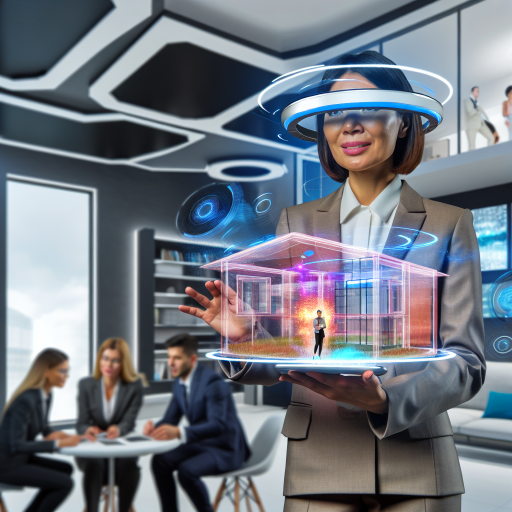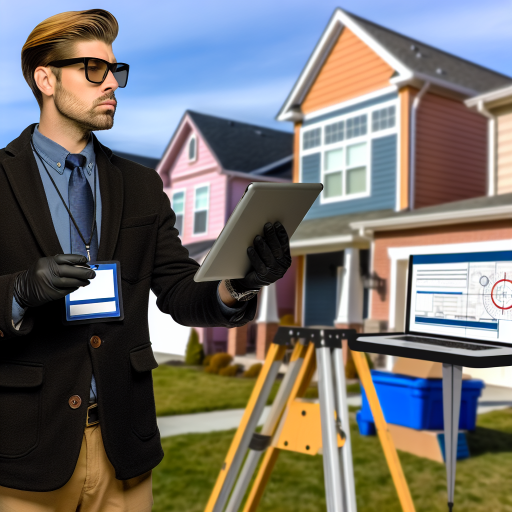Introduction
The real estate market continues to evolve rapidly, driven by changing consumer behaviors and innovative tools like virtual reality home tours.
Today’s homebuyers prefer convenience and efficiency in their search for properties.
Advanced technologies are now essential in modern house hunting.
They streamline the buying process and enhance the overall experience for both buyers and sellers.
Virtual reality (VR) has emerged as a groundbreaking technology within real estate.
It offers immersive experiences that traditional viewings simply cannot match.
Homebuyers can virtually walk through properties from the comfort of their own homes.
This capability significantly broadens the market reach for real estate agents and developers.
Many buyers, particularly younger generations, expect tech innovations in their house-hunting journey.
They appreciate virtual tours that allow them to explore homes interactively.
Gone are the days of tedious and time-consuming in-person showings.
Instead, VR experiences provide instant access to potential homes, which can be immensely beneficial.
With VR, sellers can showcase their properties more effectively.
High-quality 3D models and interactive features attract a wider audience.
Agents can leverage this technology to highlight unique selling points.
Engaging visuals can create a lasting impression on potential buyers.
Moreover, VR eliminates geographical limitations, connecting buyers with properties far beyond their local market.
This development is especially advantageous for out-of-state buyers or investors.
They can make informed decisions without traveling long distances for viewings.
As the real estate sector embraces VR, it enhances the overall buying experience.
Customers feel more confident in their choices after exploring a home virtually.
This technology not only speeds up the decision-making process but also reduces the time properties spend on the market.
In fact, VR transforms house hunting by making it more accessible and engaging.
Its impact on the real estate industry is undeniably profound.
Adopting this technology will likely become a standard practice in the near future.
Understanding Virtual Reality Technology
Definition of Virtual Reality and How It Works
Virtual reality (VR) immerses users in a computer-generated environment.
This technology creates realistic simulations of real-world places and experiences.
Users wear VR headsets that provide stereoscopic displays for depth perception.
This allows them to feel as though they are part of the environment.
Through motion tracking, the system detects head movements.
This enables users to look around and explore their surroundings naturally.
VR technology relies on high-quality graphics and sound.
Together, these elements enhance the immersive experience.
Additionally, haptic feedback devices can simulate touch.
This adds another layer of realism to the experience.
Types of VR Devices Commonly Used
Different VR devices cater to various needs and preferences.
Below is a list of common VR devices used today:
- Standalone VR Headsets: These devices operate independently, without being connected to a computer or console.
Examples include the Oculus Quest and the HTC Vive Focus. - PC-Based VR Headsets: These headsets connect to powerful computers, offering high-fidelity graphics.
Popular options include the Oculus Rift S and the Valve Index. - Mobile VR Headsets: These headsets utilize smartphones to deliver virtual experiences.
Examples include the Samsung Gear VR and the Google Daydream. - Augmented Reality (AR) Headsets: These devices blend virtual images with the real world.
The Microsoft HoloLens is a leading example.
Comparison of VR with Traditional Home Viewing Methods
Comparing VR with traditional home viewing methods reveals significant advantages.
The following list outlines key differences:
- Accessibility: VR tours allow prospective buyers to view homes from anywhere, eliminating travel time.
- Convenience: Users can explore multiple properties in a short time.
This efficiency saves time for both buyers and agents. - Realism: VR creates an immersive experience.
Buyers can visualize spaces better than through photos alone. - Interactivity: Users can move through spaces, look around, and engage with property features, enhancing the experience.
- Consistency: VR experiences maintain consistent quality, unlike traditional showings that may vary greatly.
- Safety: Virtual tours allow buyers to view homes without physical visits, promoting health safety.
The Benefits of Virtual Reality Home Tours
In today’s fast-paced real estate market, technology plays a crucial role in how buyers and sellers interact.
Virtual reality (VR) is leading this charge, changing how people view homes.
With advanced VR home tours, the process of house hunting transforms into an engaging experience.
Let’s delve into the benefits of virtual reality home tours, exploring their impact on both potential buyers and sellers.
Enhanced Engagement and Immersive Experiences for Potential Buyers
One of the standout features of virtual reality home tours is the level of engagement they offer.
Traditional methods of viewing homes often lack the immersive elements that VR provides.
When potential buyers explore properties using VR, they step into a 3D environment that mimics the actual space.
This immersion generates excitement among buyers.
Instead of viewing static photos, users can navigate rooms and interact with the environment.
They can visualize themselves living in the space, which increases emotional attachment.
Moreover, VR tours allow buyers to examine details closely.
Features like textures, colors, and layouts come to life.
This capability enables buyers to make more informed decisions about their preferences.
Time and Cost Efficiency for Both Buyers and Sellers
Another compelling benefit of virtual reality home tours is the time and cost efficiency they introduce into the house-hunting process.
- Saves Time: Potential buyers often need to schedule multiple property visits.
However, with VR, they can tour several homes in a shorter amount of time.
This efficiency allows them to narrow down their choices quickly. - Reduces Travel Costs: Buyers, especially those relocating, often face significant travel expenses.
Virtual tours eliminate the need for frequent trips.
They can view properties remotely, saving both time and money. - Streamlines Showings: Sellers can offer virtual tours to multiple prospective buyers at once.
This strategy reduces the inconvenience of traditional open houses.
This efficiency leads to a smoother home-buying experience, benefiting everyone involved in the transaction.
Ability to View Multiple Properties Without Geographical Constraints
Virtual reality home tours break down geographical barriers that often hinder the house-hunting process.
Buyers can explore properties in different regions without leaving their homes.
- Access to Distant Markets: Some buyers may be interested in properties far from their current location.
Virtual tours allow them to explore distant markets effortlessly. - Broader Property Selection: Geographic restrictions limit options in traditional viewings.
With VR, buyers can assess properties in various neighborhoods, increasing their chances of finding the ideal home. - Enhanced Flexibility: Time zones and travel schedules pose challenges for many buyers.
VR tours allow buyers to view properties at their convenience, regardless of time or location.
This accessibility proves invaluable, particularly for relocating professionals or those navigating busy schedules.
Potential buyers gain unprecedented flexibility in their search for a new home.
The transformation of house hunting through virtual reality represents a significant leap forward in real estate technology.
Enhanced engagement and immersive experiences captivate potential buyers, making home searching more enjoyable.
Time and cost efficiencies streamline the process for both buyers and sellers, allowing for a more manageable experience.
Furthermore, the ability to explore multiple properties without geographical constraints broadens the search options available to buyers.
Virtual reality home tours are not just a passing trend; they are becoming essential tools in modern real estate.
As technology continues to evolve, we can expect to see even more advancements in the virtual reality space.
These changes will likely lead to further enhancements in house hunting.
For now, prospective buyers and sellers alike can appreciate the benefits that VR tours bring to the real estate market.
Basically, virtual reality is reshaping how we think about home viewing.
It offers engaging, efficient, and flexible solutions that cater to the needs of today’s buyers and sellers.
Embracing this technology could very well be the key to successful real estate transactions in the future.
Read: The Role of AI in Home Valuations You Can’t Ignore
How Virtual Reality is Changing Buyer Expectations
The evolution of technology has profound impacts on various industries.
The real estate market is no exception to this trend.
Buyers now seek more engaging, immersive experiences when searching for their dream homes.
Virtual reality (VR) is at the forefront of this transformation.
It fundamentally changes how buyers approach the house-hunting process.
Demand for Technology in the Home Buying Process
Today’s buyers expect seamless integration of technology into their home buying experience.
This demand stems from several key factors:
- Convenience: Homebuyers prefer to explore properties from the comfort of their homes.
The UI/UX design of VR applications makes this process user-friendly. - Accessibility: Buyers from different geographical locations can view homes without physical travel.
VR tours bridge distance barriers, enabling global reach for sellers. - Time Efficiency: Buyers spend less time visiting homes physically.
They narrow down options with VR tours before scheduling in-person visits. - Engagement: Interactive VR experiences captivate buyers.
They can explore homes at their own pace without pressure from agents.
These factors contribute to an increasing expectation for technology in real estate dealings.
As a result, buyers now regard virtual tours as a standard feature rather than an added perk.
The Role of VR in Creating a High-Quality Property Experience
Virtual reality effectively revolutionizes the property viewing experience.
It allows potential buyers to immerse themselves in the property, creating a meaningful connection through:
- 360-Degree Views: VR enables buyers to look around in every direction, enhancing spatial awareness.
They can view each room’s layout and understand the home’s flow. - Realistic Detail: High-definition images and videos replicate real-life conditions.
Buyers can appreciate textures, colors, and finishes more authentically. - Sensible Navigation: Users can move seamlessly through the property.
This freedom leads to a personalized viewing experience that resonates with buyers. - Interactive Features: Many VR tours include clickable elements that provide extra information.
For instance, they can highlight property features or local amenities.
Such high-quality experiences are changing the buyer’s expectations significantly.
They no longer settle for simple photos or basic video walkthroughs.
Instead, they expect comprehensive virtual tours that present a clear picture of a property’s value.
Customizable Experiences
Another remarkable advantage of virtual reality is its capacity to offer customizable experiences.
Homebuyers increasingly desire personalized touches; VR can deliver this in various ways:
- Virtual Staging: This innovative feature allows buyers to visualize spaces differently.
They can see potential with stylish furniture and décor choices, enhancing the home’s appeal. - Personal Preferences: Buyers can filter through different styles and layouts.
They can customize their tours to highlight features that align with their tastes. - Interactive Design Tools: Some VR platforms offer tools to remodel spaces virtually.
Buyers can modify room layouts, colors, and materials directly during the tour. - Local Area Exploration: VR can extend beyond the property itself.
Users can explore neighborhoods and amenities to see if it meets their lifestyle needs.
This level of customization empowers buyers.
They feel more in control of their home buying journey.
As a result, they engage more deeply, leading to informed decision-making.
The Impact on Real Estate Agents
As buyer expectations shift, real estate agents must adapt their strategies.
Agents now utilize VR technology to remain competitive.
The integration of VR into their toolkit provides several benefits:
- Enhanced Marketing: Agents can create standout listings.
High-quality virtual tours distinguish properties in a crowded market. - Time Management: By offering virtual tours, agents reduce time spent on in-person showings.
This efficiency allows them to focus on closing deals. - Networking Opportunities: Agents can market properties to wider audiences.
Remote buyers can engage without geographical constraints. - Data-Driven Insights: Using VR can collect valuable analytics.
Agents can analyze which properties receive more attention during tours.
Moreover, real estate professionals who embrace VR technology position themselves as innovators.
They reflect a commitment to meeting buyer expectations, enhancing client relationships in the process.
Challenges and Considerations
Despite these advancements, challenges remain.
Transitioning to virtual reality requires investment in technology.
Therefore, agents and buyers must consider several factors:
- Cost: Developing high-quality VR content can be expensive.
Budget implications may affect smaller agencies more significantly. - Technology Accessibility: Some buyers may lack access to the necessary VR hardware.
This situation might limit their engagement with virtual tours. - Realism vs. Expectations: If the VR representation is less realistic, it can mislead buyers.
Striking a balance is crucial to avoid disappointment. - Technical Difficulties: VR technology is still evolving.
Technical issues can affect the experience, leading to frustration for both agents and buyers.
By being mindful of these challenges, real estate professionals can enhance their virtual offerings.
A thoughtful approach ensures that VR continues to meet evolving buyer expectations.
In short, the integration of virtual reality into the home-buying process reshapes how buyers interact with properties.
By leveraging technology, agents and sellers create a more enriching experience.
As VR technology continues to advance, the expectations of buyers will only continue to evolve.
Read: How Real Estate Technology is Revolutionizing the Industry

Case Studies: Successful Implementations of VR Tours
Virtual reality (VR) home tours have revolutionized the real estate industry.
Many agencies have embraced this technology.
They have reported significant improvements in engagement and sales.
Below are some prominent examples and statistics demonstrating the effectiveness of VR tours in real estate.
Examples of Real Estate Agencies Using VR
- Weichert Realtors: This agency began offering VR tours to enhance listings.
They provide immersive experiences that attract more potential buyers. - Keller Williams: They have invested in VR technology for their agents.
Their use of VR helps agents provide clients with a more detailed view of properties. - Redfin: This company utilizes VR home tours extensively.
Their efforts allow clients to explore homes across various locations without physical travel. - Compass: They have integrated VR tours into their marketing strategy.
Compass agents can showcase properties effectively, leading to faster sales.
Increased Engagement Rates
Several studies have shown that VR tours lead to higher engagement rates.
Here are some statistics from prominent agencies:
- Weichert Realtors: Reports a 30% increase in property inquiries after implementing VR tours.
- Keller Williams: Noted a 25% rise in virtual visits, increasing the likelihood of in-person tours.
- Redfin: Found that listings with VR tours sold 20% faster than those without.
- Compass: Experienced a 40% increase in buyer engagement, resulting in higher offers on homes.
Buyer Testimonials
Many homebuyers now prefer VR tours.
Their experiences highlight the convenience and effectiveness of this technology.
Here are some real testimonials from satisfied buyers:
- Sarah J., a first-time homebuyer: “I loved taking VR tours.
They helped me envision my future home without driving around town!” - Mike D., a relocating professional: “VR tours saved me time.
I could view several homes within an hour, making my decision easier.” - Anna K., an investor: “I appreciate the detail in VR tours.
I could assess properties thoroughly before making offers.” - Tom and Lisa R., parents: “We found our dream home through a VR tour.
It was perfect since we had kids and limited time to visit properties.”
Technological Impact and Benefits
In addition to increasing engagement, VR tours offer numerous benefits.
These advantages enhance the overall home-buying experience:
- Time-saving: Buyers can view multiple properties in a shorter amount of time, streamlining their search process.
- Accessibility: Individuals with mobility issues face fewer barriers when viewing homes remotely.
- Detailed Visuals: 360-degree views provide a comprehensive look at homes, highlighting features potential buyers may otherwise miss.
- Reduced Travel Costs: Buyers can minimize commuting expenses by attending virtual tours from home.
- Informed Decisions: VR tours equip buyers with all necessary information for making informed choices.
Challenges and Considerations
While VR tours offer numerous benefits, challenges remain.
Real estate agencies must navigate these hurdles to ensure success:
- Initial Costs: Implementing VR technology requires a financial commitment, which may deter some agencies.
- Technology Limitations: Not all properties are suitable for VR tours, particularly older homes lacking modern updates.
- User Experience: Some buyers may be unfamiliar with VR technology, affecting their overall experience.
- Integration with Traditional Marketing: Collaborating VR tours with conventional strategies requires careful planning.
- Training Staff: Agencies must invest time in training staff members to utilize VR technology effectively.
Looking Ahead: The Future of VR Tours
The future of VR home tours looks promising.
As technology continues to advance, VR may become commonplace in real estate.
- Enhanced Features: Future VR tours may integrate augmented reality, allowing buyers to visualize renovations or furniture placements.
- Broader Adoption: More agencies will likely adopt VR technology to remain competitive in the market.
- Decreased Costs: As technology develops, the cost of VR equipment and software may decrease, making it accessible for more agencies.
- Increased User Comfort: Enhanced user interface designs will make virtual experiences more intuitive.
- Greater Market Reach: VR tours can help agencies appeal to international buyers, expanding their market significantly.
In essence, the successful implementation of VR tours has undeniably transformed house hunting.
With solid case studies demonstrating increased engagement and positive buyer experiences, the future appears bright for VR in real estate.
As technology continues to evolve, the role of VR in home buying will become even more significant.
Real estate agencies that embrace this innovation will likely reap substantial benefits, leading to increased sales and satisfied clients.
Read: Drones for Aerial Property Views
Challenges and Limitations of Virtual Reality in Real Estate
Virtual reality (VR) has revolutionized various industries, including real estate.
However, it comes with challenges and limitations that both buyers and sellers face.
Understanding these challenges can help stakeholders make informed decisions in the house-hunting process.
High Costs of VR Technology and Content Creation
Implementing virtual reality in real estate comes with significant financial burdens.
These costs can deter smaller agencies from adopting VR technology.
Here are some specific points regarding these high expenses:
- Hardware Expenses: High-quality VR headsets and computers are costly.
These devices must provide a seamless experience to users. - Software Development: Creating VR content requires specialized software.
Developing interactive and engaging virtual tours can escalate costs significantly. - Maintenance Costs: Keeping the VR systems updated and running smoothly can lead to ongoing expenses.
Regular software updates and hardware maintenance are vital for optimal performance. - Training Costs: Agents and staff must undergo training to use VR technology effectively.
This training incurs both time and financial costs. - Marketing Expenses: Promoting a property using VR tools may require additional marketing expenditures.
Agencies need to showcase their VR capabilities to attract clients.
These financial challenges can inhibit widespread adoption in the real estate market.
Small agencies might struggle to justify these expenses against their current marketing methods.
Therefore, despite its advantages, VR technology remains underutilized in many regions.
Technical Issues and Accessibility Concerns
While VR technology offers unique experiences, it presents several technical challenges.
These issues can frustrate both buyers and real estate professionals.
Some common technical concerns include:
- Software Bugs: Users may encounter software glitches during tours.
These bugs can result in a frustrating experience and lead to disinterest. - Compatibility Problems: Not all devices support VR content.
Buyers may struggle to access tours on their smartphones or computers, limiting the technology’s reach. - Internet Connectivity: High-speed internet is crucial for an effective VR experience.
Buyers with slow connections may find it difficult to access 3D content or experience delays during tours. - User Interface Issues: A complicated user interface can confuse users.
A clear and easy-to-navigate interface is essential for maximizing engagement. - Physical Limitations: Certain users may experience discomfort or motion sickness while using VR.
Creating a comfortable experience is vital for maintaining user engagement.
Addressing these technical challenges requires considerable investments in technology, training, and support.
Buyers, sellers, and agents must remain patient as the industry evolves with VR advancements.
The Need for Buyers to Adapt to New Technology
Embracing virtual reality in the real estate market requires changes in user behavior.
Buyers may feel overwhelmed by these new technologies initially.
Some factors influencing adaptation include:
- Learning Curve: New technology requires buyers to understand how to use it.
This learning curve can discourage less tech-savvy individuals. - Resistance to Change: Many buyers feel comfortable using traditional methods.
Overcoming this comfort zone may take time and effort. - Education and Training: Agencies must invest in educating their clients about VR.
Providing hands-on assistance can help buyers feel more confident using the technology. - Device Availability: Not all buyers may have access to VR devices.
Agencies should consider providing demo units to enhance the experience. - Generational Differences: Older generations may struggle with adapting to VR technology.
Real estate agents must recognize these differences and work to bridge the gap.
The adaptation to virtual reality can vary among buyers.
Some may embrace the innovation quickly, while others may take time to adjust.
Real estate agents need to address these concerns when offering VR tours.
Virtual reality offers transformative capabilities for home buyers and real estate professionals.
However, challenges such as high costs, technical issues, and the need for adaptation exist.
By addressing these limitations, the industry can accelerate the integration of VR into the house-hunting process.
Ultimately, balancing innovation with accessibility will determine how effectively VR will become a standard tool in real estate.
Stakeholders must collaborate to overcome these challenges and embrace the potential of virtual reality technology.
Read: Chatbots: Revolutionizing Client Queries
Future Trends in Virtual Reality for House Hunting
The world of real estate is rapidly evolving.
Virtual reality (VR) is playing a pivotal role in this evolution.
As buyers become more tech-savvy, expectations shift.
Future trends in VR technology promise to redefine house hunting in significant ways.
Let’s explore some of the advancements on the horizon and their likely impacts.
Predictions for Advancements in VR Technology
VR technology is advancing at an astonishing rate.
Here are some predictions for the future of VR in real estate:
- Increased Realism: Next-generation VR headsets will provide incredibly realistic environments.
Improvements in graphics will make virtual homes indistinguishable from reality. - Better User Interfaces: Future VR platforms will feature enhanced usability.
Users will navigate virtual spaces more intuitively and seamlessly. - Higher-Quality Graphics and Sounds: Expect immersive soundscapes.
High-definition graphics will bring properties to life more than ever before. - Enhanced Mobile VR: With improvements in mobile technology, VR will be accessible anywhere.
This will allow potential buyers to tour homes from anywhere. - Virtual Collaboration Tools: Agents and buyers will share virtual spaces in real-time.
This will facilitate collaborative decision-making and feedback. - Integration of Social Features: Future VR experiences may include social components.
Buyers can invite friends and family to join virtual tours for their input.
The Integration of AI and AR with VR in Real Estate
The integration of artificial intelligence (AI) and augmented reality (AR) with VR is highly anticipated.
This fusion will create an even more comprehensive experience for homebuyers.
Here’s what to expect:
- Personalized Virtual Tours: AI will analyze buyer preferences.
As a result, it will customize tours to highlight properties that best match individual tastes. - Enhanced Staging Capabilities: AR can superimpose furniture and decor onto VR tours.
Buyers will envision living in the space more easily. - Chatbots for Real-Time Assistance: AI-driven chatbots will assist users during tours.
They can answer questions, provide details, and guide users through properties. - Data-Driven Insights: AI will analyze market trends and predict property values.
This data will help buyers make informed decisions. - Seamless Integration of VR and AR: The combination of these technologies will create hybrid experiences.
Buyers can switch between virtual and augmented reality easily. - Smart Home Previews: Potential buyers will tour homes equipped with smart technology.
They will experience the integration of technology with the house.
Potential Changes in Buyer Behavior Influenced by Ongoing Tech Development
As technology develops, buyer behavior will undoubtedly shift.
Here are some potential changes:
- Increased Comfort with Remote Purchases: As VR becomes standard, buyers will be more comfortable purchasing homes sight unseen.
The virtual experience fosters confidence in remote transactions. - Increased Demand for Virtual Tours: With convenience in mind, buyers will prefer to start their search online.
This demand will push sellers to invest in VR tours. - Focus on Experiences: Buyers will prioritize experiences over physical visits.
Virtual previews will become the norm, reshaping the traditional open house format. - Wider Geographical Reach: Buyers can explore homes in different cities or states virtually.
This will broaden the market and increase competition. - Emphasis on Visual Appeal: As visual experiences become paramount, properties with high-quality VR representations will attract more interest.
A stunning virtual tour can be a game-changer. - Consumer Reviews and Influence: Buyer reviews on virtual experiences will affect property desirability.
Word-of-mouth and social media reviews will play a significant role.
In general, the future of virtual reality in house hunting looks incredibly promising.
As technology advances, so too will the home buying experience.
Buyers will enjoy enhanced tools, personalized tours, and improved accessibility.
Ultimately, these trends will shape the dynamics of real estate, making it easier and more fascinating for potential homeowners.
Conclusion
Virtual reality has revolutionized the home-buying experience.
Buyers can now explore properties without physical limitations.
This technology offers a unique perspective and enables clients to visualize spaces fully.
They can immerse themselves in a digital environment from the comfort of their homes.
As a result, home-hunting becomes more efficient and engaging.
The transformative impact of VR extends beyond convenience.
It allows real estate agents to showcase properties creatively.
With VR, agents can create immersive experiences that attract potential buyers.
This innovative approach enhances marketing strategies and highlights properties’ best features.
Consequently, listings stand out in a competitive market.
Adapting to modern technology is essential for real estate professionals.
As buyers become increasingly tech-savvy, agents must keep pace.
Ignoring virtual reality means missing opportunities to connect with clients.
Agents now face expectations for dynamic and interactive listings.
Embracing VR enhances their competitiveness in a fast-evolving industry.
Generally, the adoption of virtual reality in real estate is not optional—it is imperative.
Real estate professionals must integrate VR experiences into their business models.
This shift not only meets client expectations but also drives sales.
By embracing this technology, agents can provide superior service and foster lasting relationships.
Real estate professionals, the time to act is now.
Invest in virtual reality technology to elevate your listings.
Engage buyers through immersive tours and detailed visualization.
Help your clients make informed decisions and discover their dream homes.
Let virtual reality transform the way you approach house hunting.




